“Why, you dirty …” Randall’s hand was flashing toward his belt.
The minister moved swiftly, closing in on Randall, knocking his hand aside even as its fingers reached the gun. Deftly, the silver-haired man spun Randall’s gun from out the holster, caught it in mid-air.
“Take it easy, Reverend,” said Packard softly. “No use of you getting mixed up in this.”
He shoved Randall backward, sent him crashing against the bar.
“I had my left fist filled all the time,” said Packard. “If he’d ever got that gun I’d tore a hole dead center through his belly.” He stared at Randall. “I don’t like people who push other folks around,” he said. “If you make a move or any of your men make a move, you’ll be eating sawdust.”
A deathly silence had fallen on the place, a brilliant silence that glittered in the lamplight.
“I don’t care whether you close up or not,” said Packard. “It ain’t no skin off my nose either way around. But the next time you speak to the Reverend, be sure you are polite.”
The silence held, a tense and breathless silence.
“Reverend,” said Packard, “maybe you better get out of here. Seventeen different kinds of hell are apt to bust loose almost any—”
Packard’s head exploded with a mighty roar. Roman candles speared across the darkness and burst with a screaming sound that spewed whirling stars … stars that grew in size and brilliance as they whirled until they were eye-searing balls of light. He was falling into a foaming sea of brilliant light and he hit it and went under and the light was dark.
Chapter II
GLASS BALLS—GLASS EYES
Slowly, Packard became aware of himself. Aware of pain that lanced across his head with throbbing, knife-like strokes. He raised his hands to his throbbing head.
“There, lad,” said a gentle voice. “Just lie back again.”
He groped for his belt, found the holster empty.
“Your guns are over on the table,” said the voice.
Packard opened his eyes and light tortured them. He shut them again, but he knew that he was not on the floor of the Crystal Palace nor sprawling in the street nor heaved in some back alley as something that had died.
“The bartender,” said the voice, “hit you with a bottle.”
Carefully Packard opened his eyes again, saw the face of the silver-haired man bending over him.
“Hi, Reverend,” he said.
“I wish you wouldn’t call me that,” the man told him. “My name is Page and they call me Preacher Page. Mostly just Preacher.”
Packard hitched himself erect, saw that he had been lying on an old and battered sofa. Ponderously, he swung his feet to the floor, sat hunched on the sofa’s edge.
“How did I get here?” he asked.
“I carried you,” said Preacher Page. He chuckled. “It was the least I could do for you after what had happened.”
Packard glanced about the room. It was furnished shabbily, but it had a certain touch … a touch of home. A rickety rocking chair stood in the corner and there was an old oblong table with a lamp placed upon an embroidered scarf. There were pictures on the wall and some books on shelves.
His guns, he saw, were on the table beside the lamp.
“So the bartender hit me,” said Packard. “Then what happened?”
“Then one of Randall’s gunmen jerked out his weapon and was pointing it at you and I shouted at him and waved the gun I’d taken from Randall. I told them: ‘Gentlemen, I should regret to shoot you, but if you harm that young man, I shall have to do it.’”
“Would you have shot?” asked Packard.
The minister’s face twisted in a grimace. “Fortunately, I didn’t have to make that decision.”
Shakily, Packard got to his feet, crossed to the table, picked up the guns. Expertly he broke them one by one, spun the cylinders to check the cartridges, slid them into his belt again.
“Thanks, Preacher,” he said. “Thanks for all you did for me.”
“But you aren’t leaving?”
“Sure, I am. I got a date with Randall.”
Preacher gasped. “But you can’t. They’ll be waiting for you. They’ll—”
“If he wants to go, Father, let him go,” said a voice from the doorway.
Packard swung around.
A girl stood there. A girl one would have known anywhere as Preacher Page’s daughter. The same quiet face, the same level eyes. Plain, thought Packard. Plain, but pretty.
“Father,” said the girl, speaking to Packard, “always is bringing home broken-down saddle tramps or young brawlers who happen to get hurt.”
“But, Alice,” protested the old man, “this gentleman stood up for me. He’s the first man since I’ve come here who stood up for me—”
Thunderous knocking hammered at the outside door, and Packard spun around, right fist jerking clear a gun.
Preacher’s voice snapped at him, a voice with the edge of steel. “Put that away. In this house there’ll be no—”
“Preacher,” snarled Packard. “Open up that door. And be sure you stand to one side when you do it.”
“There’ll be no shooting,” said Preacher. “This is my house and there’ll be—”
Packard took a step toward him. “You heard me! Open up that door … quick and fast!”
The gun came up and Preacher moved swiftly, lithely toward the door, swung it open with a jerk. In the fan of light that streamed out into the earth-packed yard stood a tall man, a man with hair graying at the temples, with cheeks that looked like tanned and wrinkled leather, a handle-bar mustache that drooped affectionately over the corners of his mouth.
“Howdy, Preacher,” said the man.
“Hello, Hurley,” said Preacher gravely.
Hurley’s eyes fastened on Packard. “If you’re Packard,” he said, “I got to talk to you.”
“Talk away,” said Packard.
Swiftly the man stepped into the room, slammed the door behind him, stood with his back against it.
“You’d better hit the trail,” said Hurley. “Stover’s on the prod.”
“Who’s Stover?”
“Stover,” explained Preacher Page, “is Randall’s top-notch gun-hand. Deadly shot, I’m told.”
“So am I,” snapped Packard.
Hurley studied Packard quietly. “Just how good a shot?” he asked.
“Good enough for Stover,” Packard told him. “Good enough for any of the two-bit gunmen who hanker for my blood. Learned it in a circus. Fellow rode ahead of me and threw up glass balls, fast. I shot them in the air.”
“You should have stayed with the circus.”
“I was agreeable,” said Packard. “But they didn’t keep me.”
Hurley chewed at the corner of his mustache. “Found out who you were, huh?”
“That’s right,” said Packard. He stared at the man, a tight, grim-lipped stare. “How come you know?” he asked.
“I rode with your daddy,” said Hurley. “Was with him when he died. Would know you anywhere. At that time he looked just like you do now.”
Hurley looked at Page. “One word of this, Preacher,” he warned, “and I personally will plumb tie you into knots.”
“Gentlemen,” said Page, “I haven’t heard a thing.”
Hurley opened the door, asked: “How about it, kid?”
Packard holstered his gun. “Just point out this Stover to me.”
The board walks were frosty beneath their boots as Packard and Hurley climbed the steps that led to the porch of the Crystal Palace. Inside the lights still burned and a dawdling swamper wielded a broom. Back of the bar the bartender was yawning and cleaning up the glassware. A drunk was sleeping it off at a table in the corner.
Hurley led the way across the room toward a door that led into the back. The swamper went on sweeping and the bartender took no notice of them. The drunk snored and sputtered in his sleep, thrashing his arms on the table top.
Читать дальше












